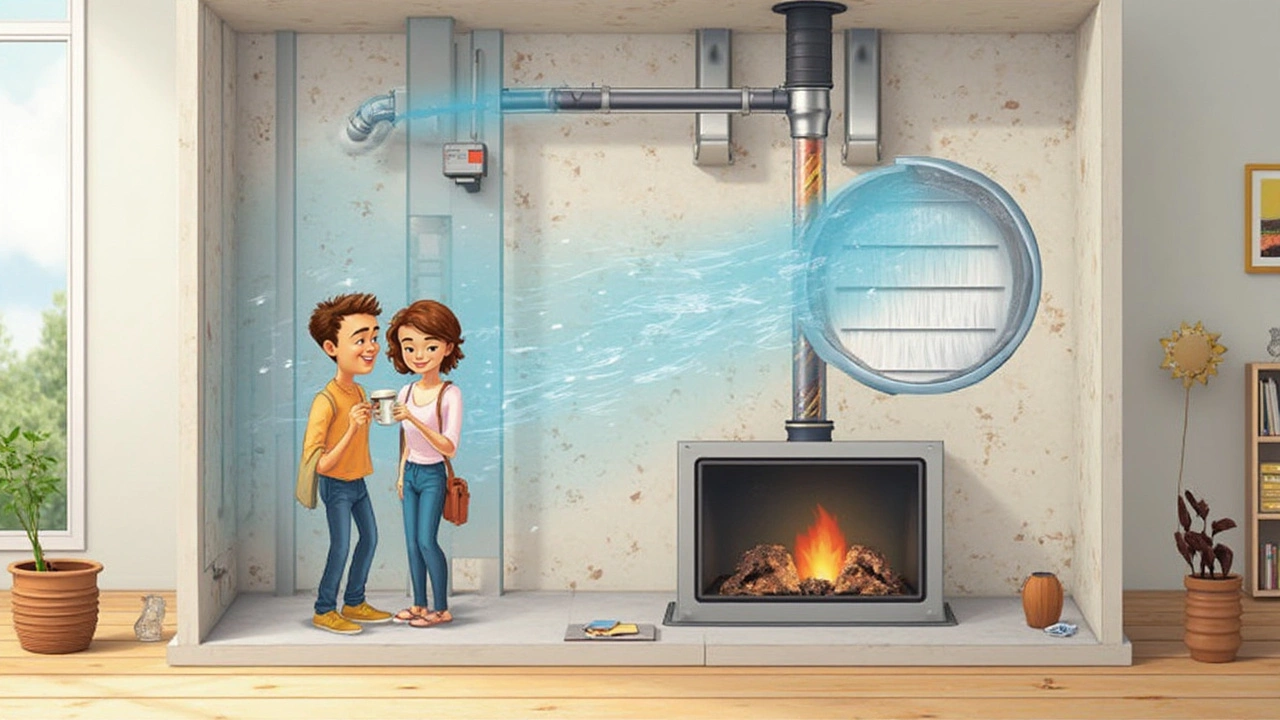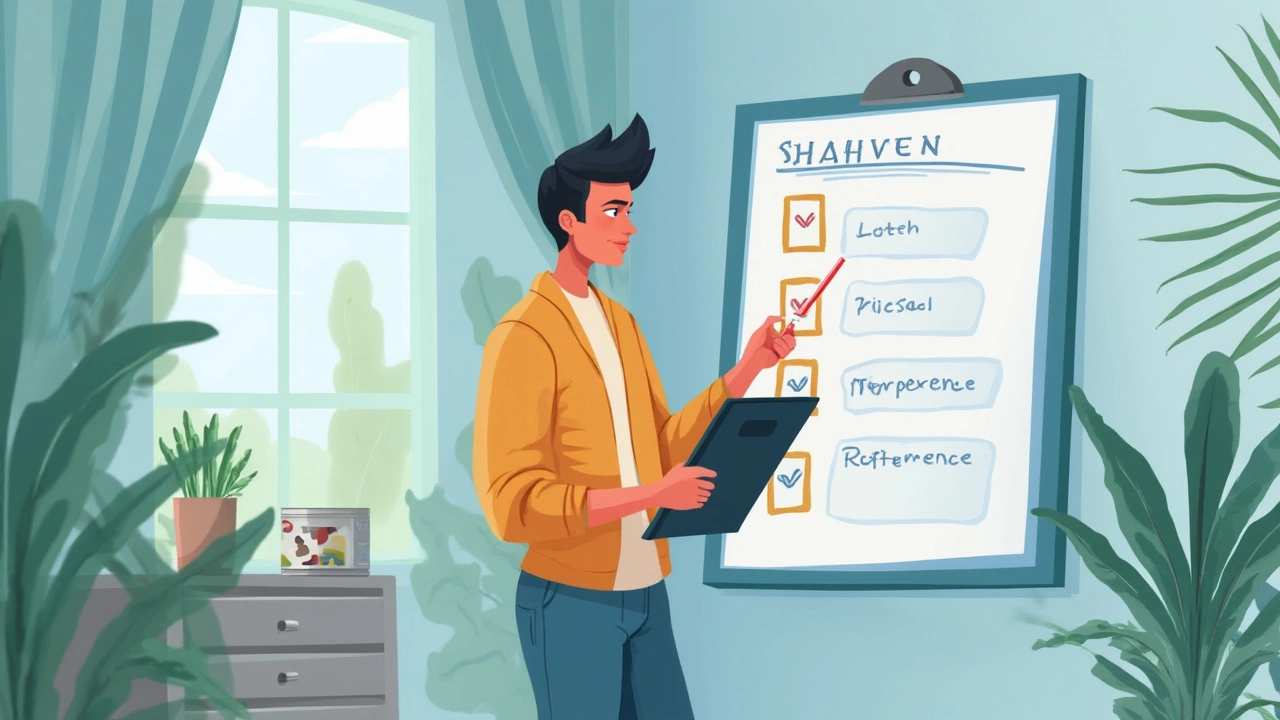If you’ve ever pulled out a dirty air filter, you’ve probably seen enough dust to make you cringe. The truth is, clogged filters do a lot more than just look gross. They force your heating and cooling system to work overtime, which bumps up your energy bill and can even wear out your system faster. Not only that, but a dirty filter blows all those trapped bits back into your air, making life rough for anyone with allergies or asthma.
So, how do you know when it’s time for a change? Forget the old “once-in-a-blue-moon” approach. The real answer depends on your lifestyle, where you live, and even if you have pets. Smart homeowners actually check their filters once a month—and many replace them every 60 to 90 days. Sounds like a lot, but the pay-off is fresh air and fewer headaches from dust and pollen.
- Why Air Filters Matter (and What Happens If You Forget)
- The Real Answer: How Often Should You Change Your Filter?
- Signs Your Filter Needs Changing (Before the Calendar Says So)
- Factors That Change the Game: Pets, Kids, and Seasons
- Quick Tips for Hassle-Free Filter Maintenance
Why Air Filters Matter (and What Happens If You Forget)
Let’s be real—air filters aren’t just there to stop dust from swirling around your living room. Their biggest job is grabbing stuff you don’t want to breathe: pollen, dust mites, pet hair, mold spores, and all kinds of gunk that floats through your vents. If you forget about them, every breath pulls all that junk right back inside. Not great, especially for allergies or asthma.
But it’s not just about your lungs. When your filter’s clogged, your HVAC system has to push harder to pull air through. That means higher power bills and more wear on your system. According to the Department of Energy, a clean filter can lower your air conditioner’s energy use by up to 15%—that’s real money saved.
Here’s a side-by-side look at what happens when you neglect your air filters versus what you get if you change them on time:
| Change Filter Regularly | Neglect or Forget |
|---|---|
| Cleaner indoor air | Dust and allergens everywhere |
| Lower energy bills | HVAC works harder, costs more |
| Better HVAC performance, longer life | Higher risk of breakdowns |
| Less sneezing and coughing | More allergies and mold concerns |
Not changing your filter is a bit like never changing the oil in your car. The longer you put it off, the more problems (and expenses) pile up. Taking a couple minutes every few months can spare you from bigger bills, musty air, and breakdown panic calls when your system suddenly gives up.
- If you have pets, dusty furniture, or allergies, filters fill up sooner.
- Living near a construction site or busy road? That dirt ends up inside too.
- Modern systems are more sensitive—missing a change can throw off everything.
It all adds up: fresher air, fewer repairs, more cash left over. Ignoring this one simple part of home upkeep just isn’t worth the hassle.
The Real Answer: How Often Should You Change Your Filter?
Forget that one-size-fits-all advice you see on the packaging. How often you should swap out your home’s air filter depends on the type of filter, where you live, and who (or what) lives with you.
Here’s what you really need to know. Most basic fiberglass filters should be changed every 30 days. If you have a pleated filter, you might stretch it to 90 days—sometimes up to 6 months if you live alone and have no pets or allergies. But let’s be real: that's not most households.
- Air filters in homes with pets get dirty faster, and every furry animal adds more dander to the mix—cut the timeline in half if you own cats or dogs.
- Folks with allergies or asthma shouldn’t go past 45-60 days, even with better filters.
- If someone in your home smokes, you’ll want to change filters more often to keep the air fresh.
- Larger homes usually need filter changes more often, because they cycle more air.
If you still aren’t sure, look at the stats. According to the Department of Energy, a clean filter can lower air conditioning energy use by up to 15%. That might not sound like a ton, but on a $200 electric bill, you’d save $30 over the summer just by swapping a $10 filter. Seems like a no-brainer.
| Home Type/Situation | Filter Type | Change Frequency |
|---|---|---|
| No pets, no allergies | Pleated | Every 90 days |
| With pets | Pleated | Every 60 days |
| Allergies/asthma | Pleated/HEPA | Every 30-45 days |
| High traffic, urban | Pleated | Every 60 days |
| Vacation home | Any | Every 6 months |
If you live in an area with a lot of dust, construction, or pollen, check your filter at the end of each month—sometimes you’ll be shocked at how fast it clogs up.
Bottom line: don’t just set a calendar reminder and forget about it. Take a peek at your filter every month, especially during peak heating or cooling seasons. Changing it regularly isn’t just about breathing easier—it’s saving real money and hassle down the road.

Signs Your Filter Needs Changing (Before the Calendar Says So)
Waiting for the calendar to tell you it's time to change your air filter? That's like only brushing your teeth on New Year’s Day—pretty risky. There are some dead giveaways that your filter’s done its job and it’s time for a new one, no matter what the packaging says.
The most obvious sign: your filter looks gray or packed with dust. If it looks more like a shaggy carpet than a filter, it’s overdue. Even if it’s not totally clogged, a layer of fuzz can block airflow and push your HVAC system to the brink. If you notice dust collecting faster on your furniture or you’re sneezing a lot more inside, trust your nose—your filter isn’t catching much anymore.
Another clue is weak airflow through your vents. If your system seems to be running but you’re barely feeling any air, that’s usually a filter begging for a fresh start. Sometimes you’ll even hear your system cycling on and off more often, which means it’s struggling to keep up because of a blocked filter.
Take a look at some quick warning signs to watch for:
- Drastic change in allergy or asthma symptoms at home
- HVAC sounds louder than normal
- A musty smell coming from the vents
- Visible dirt and dust buildup on the filter itself
- Your energy bills suddenly spike for no clear reason
Big HVAC companies like Carrier and Trane have even pointed out that ignoring air filter changes can cut system efficiency by up to 15%. That’s cash down the drain just because of one simple habit. Here’s a quick glance at how different air filter conditions can impact your monthly energy cost:
| Filter Condition | Estimated Impact on Energy Bill |
|---|---|
| Clean | Normal |
| Dirty | +5% to +15% |
| Completely clogged | Up to +20% or more |
The number one rule? Don’t wait for the date. Check your air filters every month, and swap them out if you spot any of these signs. Your nose, wallet, and lungs will thank you.
Factors That Change the Game: Pets, Kids, and Seasons
There’s a reason air filter advice sounds so all over the place: everyone’s home is different. If you’re living solo with few visitors, you may get by with changing your filter every three months. But throw in a golden retriever or two, kids running in from soccer practice, or wild pollen season, and that timeline shrinks fast.
Let’s break it down a bit:
- Pets: Dog and cat hair is an obvious culprit, but the dander you can’t see is even worse for your filters. Homes with pets should swap filters at least every 60 days. Got more than one? Every 30-45 days is smarter.
- Kids: Little ones track in all sorts of dirt, dust, and allergens. More feet in the house means more stuff clogging your filter. If your family’s growing or you host sleepovers, err on the side of changing your filter more often.
- Allergy Season: Pollen turns your filter into a magnet for microscopic trouble. If you notice allergy symptoms creeping up, check the filter monthly, especially in spring and fall.
- Home Location: Living in a city, near a highway, or in the middle of a farm field? Outdoor air pollution or dust storms will fill your filter a lot quicker than you think.
Here’s a handy cheat sheet, so you’re not just guessing:
| Situation | Recommended Filter Change |
|---|---|
| No pets, no allergies | Every 90 days |
| One pet | Every 60 days |
| Multiple pets or allergies | Every 30-45 days |
| Baby or small kids at home | Every 60 days |
| Peak pollen season or smoke | Check monthly |
The takeaway? Don’t trust the calendar blindly. Walk over, pop the cover off your air filters, and take a look. If it looks dusty or gray, swap it out—your nose (and wallet) will thank you.

Quick Tips for Hassle-Free Filter Maintenance
Changing out air filters isn’t rocket science, but most people forget or put it off until there’s a problem. If you want better air filters doing their job, a little planning goes a long way.
- Mark Your Calendar: Set a reminder on your phone or stick a note on your fridge for every 1-3 months. If you have pets or allergies, lean toward the shorter end of that timeframe.
- Buy in Bulk: Grab a multi-pack of filters so you’ve always got spares. You’ll save cash and never get caught with a clogged one again.
- Check the Fit: Write down the size stamped on the old filter before you hit the store. Wrong-sized filters don’t trap dust and let dirty air sneak by.
- Snap a Before-and-After: Take a quick pic of a clean filter when you swap it for a dirty one. It’s the easiest way to remind yourself what a new filter should look like.
- Don’t Skip the Vents: Vacuum your vents and the spot around your filter every so often so new filters don’t clog up right away.
If you’re not sure how often to really change your filter, track how fast it gets dirty for a few months. Here’s what home pros usually look for:
| Home Type | Recommended Change Frequency |
|---|---|
| No pets, low dust | Every 3 months |
| One pet or light allergies | Every 2 months |
| Multiple pets/allergy sufferers | Every 20-45 days |
| Heavy traffic/urban area | Every 30-60 days |
Toss used filters straight into the trash—never try to clean and reuse them. Most are made for single use, and water won’t get rid of all the trapped gunk anyway.
If you want to make things really painless, pick up filter subscription services online. These companies send new filters to your doorstep exactly when you need them. One less thing to remember and your air stays fresh all year.

